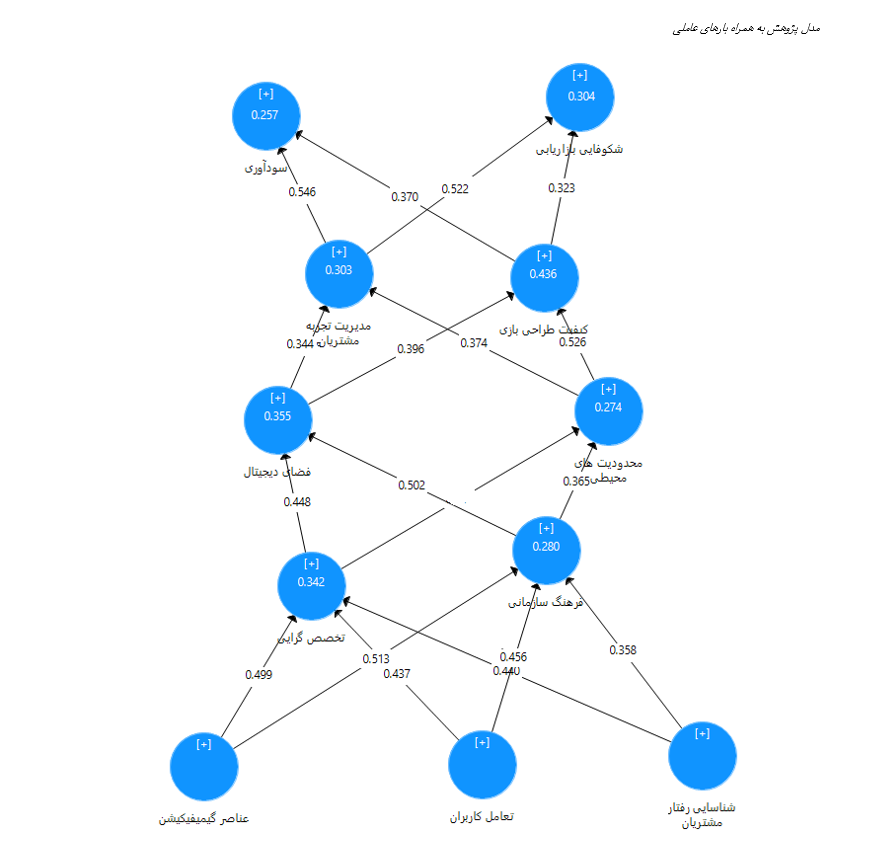Investigating Factors Affecting Gamification in Digital Marketing at Tehran Technical Complex
Keywords:
Gamification, Digital Marketing, Tehran Technical Complex, User Engagement, Structural Equation Modeling , Profitability , Digital EnvironmentAbstract
This study investigates the factors influencing gamification in digital marketing at Tehran Technical Complex. The primary aim is to identify and analyze the components that contribute to the success of gamification and enhance user engagement, customer experience, and organizational profitability. The research employed a mixed-methods approach, incorporating both qualitative and quantitative phases. In the qualitative phase, semi-structured interviews were conducted with experts and managers from Tehran Technical Complex, and the data were analyzed using grounded theory. In the quantitative phase, a researcher-designed questionnaire, informed by the qualitative findings, was distributed to 384 marketing professionals. The quantitative data were analyzed using structural equation modeling (SEM). The results indicated that user engagement, the digital environment, and profitability are the most critical factors affecting the success of gamification in digital marketing. Additionally, identifying customer behavior and managing customer experience were also significant. Organizational culture and specialization had a moderate impact, while environmental constraints and certain gamification elements showed a lesser influence compared to other factors. This study highlights that effective gamification design and the creation of interactive digital environments can significantly enhance user experience and organizational profitability. However, for sustained success, organizations must foster a culture of innovation and provide the necessary specialized infrastructure. The findings suggest that gamification should be implemented strategically, considering user needs and environmental conditions.
Downloads
References
Al-Zyoud, M. F. (2021). The impact of gamification on consumer loyalty, electronic word-of mouth sharing and purchase behavior. Journal of Public Affairs, 21(3), e2263. https://doi.org/10.1002/pa.2263
Barari, M. (2024). How and When Does Gamification Level Up Mobile App Effectiveness? Meta-Analytics Review. Marketing Intelligence & Planning, 42(6), 1093-1114. https://doi.org/10.1108/mip-10-2023-0569
Başaran, Ü. (2022). Gamification in Marketing. 137-165. https://doi.org/10.4018/978-1-7998-9223-6.ch007
Behl, A., Jayawardena, N. S., Shankar, A., Gupta, M., & Lang, L. D. (2023). Gamification and Neuromarketing: A Unified Approach for Improving User Experience. Journal of Consumer Behaviour, 23(1), 218-228. https://doi.org/10.1002/cb.2178
Berger, V. (2019). Social Norm-Based Gamification to Promote Eco-Friendly Food Choice. Journal of Consumer Marketing, 36(5), 666-676. https://doi.org/10.1108/jcm-01-2018-2547
Girdauskiene, L. (2022). Gamification as an Innovative Instrument for Employee Engagement. Marketing and Management of Innovations, 1(1), 10-17. https://doi.org/10.21272/mmi.2022.1-01
Harwood, T., & Garry, T. (2015). An Investigation Into Gamification as a Customer Engagement Experience Environment. Journal of Services Marketing, 29(6/7), 533-546. https://doi.org/10.1108/jsm-01-2015-0045
Haryanti, D. (2023). Optimizing Marketing Learning Evaluation: Gamification With CIPP Model at SMKN 1 Bandung. J. Curric. Dev., 2(2), 251-268. https://doi.org/10.17509/curricula.v2i2.63765
Hofacker, C. F., Ruyter, K. d., Lurie, N. H., Manchanda, P., & Donaldson, J. (2016). Gamification and Mobile Marketing Effectiveness. Journal of Interactive Marketing, 34(1), 25-36. https://doi.org/10.1016/j.intmar.2016.03.001
Huotari, K., & Hamari, J. (2016). A Definition for Gamification: Anchoring Gamification in the Service Marketing Literature. Electronic Markets, 27(1), 21-31. https://doi.org/10.1007/s12525-015-0212-z
Kusumawardani, K. A., Widyanto, H. A., & Tambunan, J. E. G. (2023). The Role of Gamification, Social, Hedonic and Utilitarian Values on E-Commerce Adoption. Spanish Journal of Marketing - Esic, 27(2), 158-177. https://doi.org/10.1108/sjme-09-2022-0188
Leclercq, T., Hammedi, W., & Poncin, I. (2018). The Boundaries of Gamification for Engaging Customers: Effects of Losing a Contest in Online Co-Creation Communities. Journal of Interactive Marketing, 44(1), 82-101. https://doi.org/10.1016/j.intmar.2018.04.004
Loureiro, S. M. C., Bilro, R. G., & Angelino, F. (2020). Virtual Reality and Gamification in Marketing Higher Education: A Review and Research Agenda. Spanish Journal of Marketing - Esic, 25(2), 179-216. https://doi.org/10.1108/sjme-01-2020-0013
Milanesi, M., Guercini, S., & Runfola, A. (2022). Let’s Play! Gamification as a Marketing Tool to Deliver a Digital Luxury Experience. Electronic Commerce Research, 23(4), 2135-2152. https://doi.org/10.1007/s10660-021-09529-1
Mok, T. L. (2024). Fun as the Principle Experience: A Systematic Review of Gamification in Marketing. https://doi.org/10.32920/25164581.v1
Mulcahy, R., McAndrew, R., Russell‐Bennett, R., & Iacobucci, D. (2021). “Game On!” Pushing Consumer Buttons to Change Sustainable Behavior: A Gamification Field Study. European Journal of Marketing, 55(10), 2593-2619. https://doi.org/10.1108/ejm-05-2020-0341
Ndi, A. (2018). Digital Marketing Gamification and Limitations of Its Strategic Power: Exploring the Online Universe of the Consumer in Critical Contexts of Political Economy. Greener Journal of Internet Information and Communication Systems, 4(1), 20-29. https://doi.org/10.15580/gjiics.2018.1.112018162
Noorbehbahani, F., Salehi, F., & Zadeh, R. J. (2019). A Systematic Mapping Study on Gamification Applied to E-Marketing. Journal of Research in Interactive Marketing, 13(3), 392-410. https://doi.org/10.1108/jrim-08-2018-0103
Saprikis, V., Spanou, M. S., Despotakis, N., & Katos, G. (2023). Evaluating customer perceptions toward AR-based online shopping: An analysis of the effects of gamification on brand engagement. European Journal of Marketing, 57(6), 1465-1492. https://doi.org/10.1108/EJM-12-2021-0923
Thorpe, A. S., & Roper, S. (2017). The Ethics of Gamification in a Marketing Context. Journal of Business Ethics, 155(2), 597-609. https://doi.org/10.1007/s10551-017-3501-y
Tsou, H.-T. (2023). How Gamification Elements Benefit brand Love: The Moderating Effect of Immersion. Marketing Intelligence & Planning, 41(7), 1015-1036. https://doi.org/10.1108/mip-04-2023-0143
Yang, Y., Asaad, Y., & Dwivedi, Y. K. (2017). Examining the Impact of Gamification on Intention of Engagement and Brand Attitude in the Marketing Context. Computers in human Behavior, 73, 459-469. https://doi.org/10.1016/j.chb.2017.03.066

Downloads
Published
Submitted
Revised
Accepted
Issue
Section
License
Copyright (c) 2025 Maryam Sharifi Hashjin (Author); Farzad Asayesh; Mahmoud Ahmadi Sharif (Author)

This work is licensed under a Creative Commons Attribution-NonCommercial 4.0 International License.










